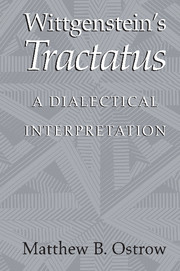III - The essence of the proposition
Published online by Cambridge University Press: 03 February 2010
Summary
Wittgenstein's attempt to undermine what he sees as the heart of the philosophical endeavor would seem to be already well under way with the completion of his initial account of analysis. It is not, then, that the straightforward attacks on the central notions of logic at 4.1272, 4.1274, and 4.128 – or even his later 6.54 denial of significance to all of his own propositions – represent a sudden shift in the direction of the Tractatus. Instead, we have seen that these remarks should be understood as more explicit statements of what is Wittgenstein's fundamental point throughout – or, perhaps better, as indications of how we are to regard the seemingly more metaphysical claims in the earlier sections of the text. If we accept such an interpretation, however, one might well wonder what work is left to be done after the 3s and early 4s. Would not the central steps toward finding “ on all essential points, the final solution of the problems” (TLP Preface) of philosophy already have been taken, a third of the way through the Tractatus? What, then, is the purpose of the rest of the book? Moreover, one might also wonder how the account that we have given squares with Wittgenstein's subsequent concern to specify the “general form of the proposition” and his claim at 5.471 and 5.4711 that this specification represents the essence of the proposition and, indeed, of the world. Would such ideas not imply that the real focus of “logic” is yet to be expounded, that the account up to this juncture is in some sense only preliminary?
- Type
- Chapter
- Information
- Wittgenstein's TractatusA Dialectical Interpretation, pp. 79 - 124Publisher: Cambridge University PressPrint publication year: 2001



